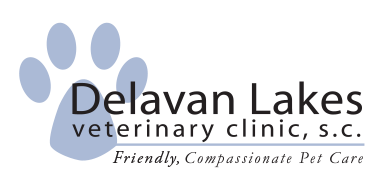For our pets, many household products contain dangerous toxins if contacted or ingested, leading to a significant number of harmful incidents.
In order to better protect your dog, cat, or other furry friend, Delavan Lakes Veterinary Clinic would like to share the top 10 most common toxins according to the ASPCA Animal Poison Control Center(APCC).
In 2016 the list was based on 180,639 calls about potential poisonings, and APCC veterinarians tabulated the 10 subjects callers were most often worried about.
Here they are, along with their percentage totals:
1) HUMAN PRESCRIPTION MEDICATIONS (16.95% OF CASES)
This category is back on top after a one-year hiatus, with the top three substances being antidepressants and heart and ADHD medications.
2) OTC PRODUCTS (16.65% OF CASES)
Over the counter products just barely dropped out of the first position, and ibuprofen was still the No. one medication APCC callers had questions about.
3) FOOD (9.84% OF CASES)
Food moved up one spot on the 2016 list compared with the previous year, mainly because of concerns about xylitol in many sugar-free products.
4) VETERINARY PRODUCTS (9.26% OF CASES)
Veterinary products moved up two places on the 2016 list. Over the counter supplements for joints and prescription pain medications made up a large percentage of the calls. Since these medications are made to taste good, pets often find the container and sneak more than they should.
5) HOUSEHOLD ITEMS (8.36% OF CASES)
Paints, glues and cleaning products are in this category, which held steady in the fourth spot.
6) CHOCOLATE (7.9% OF CASES)
Chocolate moved up one spot with an average of 39 chocolate calls fielded every day by APCC veterinarians. From brownies to candy bars, dogs love chocolate!
7) INSECTICIDES (6.92% OF CASES)
Insecticides slid from the third slot in 2015, and APCC reports the good news that these type of calls have been decreasing for several years.
8) RODENTICIDES (5.47% OF CASES)
Rodenticides moved up one spot in 2016 as people continue to fight mice and rats, not always in the safest ways.
9) PLANTS (5.2% OF CASES)
Plants dropped one spot on the 2016 list with people asking about indoor and outdoor plants and specific bouquet flowers.
10) GARDEN PRODUCTS (2.64% OF CASES)
Unfortunately, many pets find fertilizers irresistible.
More Lifesaving Resources
Learn more about the toxins pets often ingest.
*Article brought to you by ASPCA
Of course, you should always consult your veterinarian if you have questions regarding the health of your pet.
If you believe your animal may have come in contact with one of the above toxins, please contact DLVC right away at 262-728-8622.

